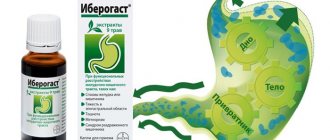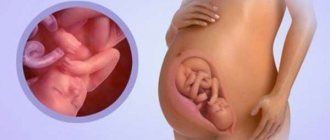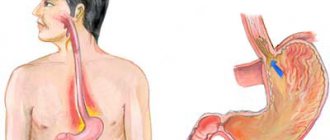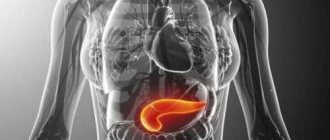A good appetite is an absolute norm for a healthy body. This is a unique mechanism that forces you to eat before your nutrient reserves are depleted. But sometimes you don’t feel like eating at the usual time, and indifference to food or complete disgust appears. Nausea, poor appetite, and general deterioration in well-being are symptoms that may indicate serious problems with the functioning of the body. In most cases, the reasons are trivial, but it is worth listening to yourself in order to identify possible violations in time.
Mild and complicated disturbances of appetite
Doctors distinguish between a mild form of appetite disturbance (a temporary decrease, usually caused by physiological reasons or minor ailments) and a complicated one, when a person experiences an aversion to food. Hyporexia (mild deviation) can be treated at home and does not always require visiting a doctor. Usually it is sufficient to normalize the diet. Anorexia (a serious illness) requires medical supervision.
Loss of appetite, especially sudden and accompanied by additional symptoms, may indicate serious disturbances in the functioning of internal organs and body systems. Additionally, nausea or fever may begin, general weakness, malaise, dizziness or headache may occur. If your appetite has disappeared without additional symptoms, and your overall health is good, then we are talking about temporary disruptions in the body’s functioning.
Food aversion what to do
If the phenomenon appears for the first time, do not be alarmed ahead of time. Pay attention also to how the food is prepared and what the dishes look like.
- Perhaps you should change the color of the dishes or even the interior of the kitchen.
- Various spices used in cooking help a lot. Experiment! More or less of them will help get rid of food aversions!
Adjust your daily routine, try to move more and monitor your mood, however, if the aversion to food does not go away within a few days, you should consult a doctor.
This symptom may hide serious disturbances in the functioning of the body; diagnosing and eliminating them is possible only under the supervision of a doctor. Do not ignore this physiological disorder, so that in the future you will not have to deal with severe, sometimes difficult to eliminate, consequences.
Sources
https://medi codo.ru/otvrashhenie-ot-edy-toshnota-interesno-pochemu-poyavlyaetsya-otvrashhenie-k-ede-otvrashhenie-k-ede-i-toshnota.html
Aversion to food, food, reasons?
https://tsitologiya .su/zheludok/otvrashhenie-k-mjasnoj-pishhe-harakterno-dlja
https://ponosa.net.ru/toshnit-zhirnoy-pishchi-prichiny/
https://www.wday.ru/krasota-zdorovie/sok/interesno-pochemu-poyavlyaetsya-otvraschenie-k-ede/
https://nikharlov. com/psihologia/pishhevoe-povedenie-kak-belok-kontroliruet-appetit-i-golod/
https://toshno.net/toshnota/286-otvrashchenie-k-myasu
https://otravlenie-wiki.net.ru/otvrashchenie-k-myasnoy-pishche-kharakterno-dlya-yazvy/
Diseases and pathological conditions
Why is there no appetite and nausea? This condition can be caused by an exacerbation of various chronic diseases, diseases of the digestive or central nervous system, heart and blood vessels. If you feel sick and have no appetite, you can talk about intoxication of the body, including food poisoning. This condition can be caused by mental disorders, endocrine disorders, or even trauma. Why do you feel sick from eating and have no appetite? All reasons can be divided into several groups:
- neuropathic, caused by the characteristics of the nervous system, for example, its increased excitability or exhaustion;
- psychopathic-like, arising as part of personality and behavior disorders caused by disorders of the brain;
- neurotic, arising as a result of reversible mental disorders;
- endogenous, caused by metabolic disorders in the brain;
- somatogenic, arising due to diseases of any organs or systems;
- mixed, that is, a combination of several factors.
Food poisoning or intoxication
Lack of appetite, accompanied by abdominal pain, nausea and vomiting, and diarrhea, in most cases indicates food poisoning. Severe intoxication is a serious threat to health, so you should definitely call a doctor at home. You can be poisoned not only by food, but also by drugs, alcohol, chemicals and toxins. Symptoms usually appear within 2-4 hours. At the same time, the body spends all its energy on eliminating the poison.
If symptoms of food poisoning appear (no appetite, nausea, diarrhea, vomiting), you need to think about what could have caused the unsatisfactory state of the body. Mild poisoning can be treated at home. You need to drink a lot of water, refuse food for a while, induce vomiting (for this, use a weak solution of potassium permanganate, salt or baking soda, irritate the root of the tongue). Among medications, absorbents (activated carbon) and enveloping agents help. Treatment of severe poisoning is carried out only under the supervision of a doctor.
If you have no appetite and feel sick due to acute respiratory viral infections, colds and other infectious diseases, this indicates that the body is spending all its strength on coping with the disease. Lack of desire to eat in such situations is completely normal. Everything returns to normal along with an improvement in overall health. Before this, it is advisable to eat small portions and follow a treated diet, that is, exclude all fried and fatty, spicy and salty foods. It is worth giving preference to light dishes, steamed, boiled or stewed.
Aversion to meat food
If a person has an aversion to meat, do not immediately panic and run to the doctor. This condition may be associated with deteriorating health, a recent serious illness, long-term depression, a stressful situation, etc. In such cases, a person may completely lose his appetite, or may develop an aversion to heavy foods, which include meat.
There may be several reasons for an aversion to meat, many of them are associated with some problems in the body and are accompanied by other symptoms:
- Digestive problems . They usually manifest themselves as a lack of appetite even for their favorite dishes, heaviness and pain in the abdomen, belching, heartburn, nausea, vomiting, abnormal bowel movements, etc. In many diseases, eating becomes a cause of discomfort and pain, so people try to avoid food, especially heavy food such as meat.
- Infectious diseases . Their first symptoms are: weakness, malaise, loss of appetite, nausea, headache. All these are signs of intoxication. Acute infectious diseases cause severe loss of strength, often accompanied by diarrhea, nausea and vomiting, which leads to deterioration and complete loss of appetite.
- Oncological diseases . Cancer causes many global changes in the body, but it is quite difficult to establish the first symptoms of its appearance. As a rule, these include increased sweating, especially at night, malaise, apathy, sudden weight loss, loss of appetite and aversion to meat.
- Nervous pathologies. One of them, which becomes the cause of aversion to meat and many other products, is considered to be anorexia. This disease is characterized as a voluntary refusal of food to get rid of extra pounds.
- Pregnancy. During pregnancy, especially in the first weeks, lack of appetite and aversion to meat are considered normal. In this case, loss of appetite may alternate with increased appetite. Often pregnancy is accompanied by toxicosis, which manifests itself as nausea at the mere mention of certain foods or their smell.
The aversion to meat is explained by several reasons. In stressful situations, after illness, or in depression, the human body becomes weaker and requires more energy. And a lot of effort is spent on digesting, breaking down and assimilating meat. Therefore, a temporary aversion to meat occurs, which usually goes away when the body is restored. In addition, aversion to meat as an animal product can be caused by emotional reasons and is associated with an aversion to eating animals. In such cases, disgust can persist for a long time and even throughout life. A person becomes a vegetarian.
People with a fine mental organization may develop an aversion to meat after watching films about the killing of animals, reading literature on this topic, and other similar situations.
Digestive system diseases
Various diseases of the digestive system can cause a complete lack of appetite. Associated symptoms are usually nausea before or after eating, heartburn, vomiting, a feeling of fullness in the stomach, heaviness, increased gas formation, abdominal pain, and so on - the clinical picture depends on the disease. You need to visit a gastroenterologist and undergo a comprehensive examination to find out the causes of your health problems. With gastritis, peptic ulcers and other pathologies, sitophobia may occur - a complete refusal to eat for fear of pain after eating. This depletes the body and aggravates the course of the disease.
Causes of lack of appetite
Pregnancy
Due to severe toxicosis and repeated painful bouts of vomiting, pregnant women in the first trimester often refuse food. In severe forms of the disease, even the smell and sight of food provokes vomiting, so women drink only water. It is possible to lose more than 5% of body weight in a few days and become severely dehydrated, which poses a danger to the health of the mother and child. Severe toxicosis is an indication for inpatient treatment.
Anorexia nervosa
Loss of interest in food and a sharp reduction in portions are typical already at the initial stage of the disease. The manifestations are caused by a pathological desire to lose weight and constant dissatisfaction with one’s body, even if there is no apparent reason for this. At first, a person may feel hungry, but prefers to maintain strict dietary restrictions. As anorexia progresses, the feeling of hunger disappears, and patients drink only water, tea or coffee for weeks.
Lack of appetite is combined with severe weakness, drowsiness, and loss of ability to work. All systems of the body suffer, metabolic processes are disrupted, therefore, when trying to force feed a patient with anorexia, he begins to vomit, and painful cramps appear in the abdomen. This condition is dangerous to health and life and requires qualified medical care.
Psychological problems
Appetite often decreases with depression, when there is a loss of motivation and interest in life, and a person becomes indifferent to what is happening. Many patients claim that they have ceased to feel the taste of foods. Frequent skipping of meals up to the point of starvation is typical. The symptom also develops during intense acute and chronic stress and emotional shock.
Infections
A short-term lack of appetite occurs in the acute period of all infectious diseases, which is caused by massive intoxication of the body with decay products of microbial cells and the accumulation of inflammatory mediators. During the entire febrile period, patients either completely refuse to eat, or eat light, low-fat meals (thin soups, cereals) a couple of times a day.
Appetite is restored after the temperature normalizes; during convalescence, an increased feeling of hunger is noted. In the chronic or latent course of infectious processes, lack of appetite occurs against the background of other symptoms: weakness and weakness for no reason, night sweats, periodic headaches and dizziness. The main infectious factors that cause loss of appetite:
- Respiratory diseases
: influenza, infectious mononucleosis, adenovirus and rhinovirus infections. - Intestinal infections
: salmonellosis, dysentery, food poisoning. - Liver damage
: viral hepatitis, echinococcosis, alveococcosis. - Sluggish processes
: tuberculosis, brucellosis, HIV infection.
Intoxication
Lack or decreased appetite is caused by various reasons: poisoning with chemical compounds and toxic industrial products, endogenous intoxication (with uremia, liver failure). The symptom becomes a consequence of damage to the autonomic centers of the brain, a general serious condition. Aversion to food as a component of asthenic syndrome sometimes persists even after detoxification measures.
Gastrointestinal pathologies
Chronic diseases of the gastrointestinal tract are accompanied by signs of constant dyspepsia, which provoke a complete absence or decrease in appetite. Sometimes patients independently limit themselves in food, since after eating the intensity of the discomfort in the stomach usually increases. Characteristic is gradual weight loss and exhaustion of patients. The most typical causes from the gastrointestinal tract, causing complete or partial lack of appetite:
- Diseases of the gastroduodenal zone
: hypoacid gastritis, peptic ulcer, duodenitis. - Intestinal pathologies
: chronic enteritis and enterocolitis, dysbiosis, bacterial overgrowth syndrome. - Damage to the digestive glands
: pancreatitis, toxic and autoimmune hepatitis. - Functional disorders
: dyspepsia, irritable bowel syndrome.
Endocrine diseases
Hormonal imbalances lead to changes in metabolic processes, a decrease in catabolic reactions, which is why appetite decreases or is lost. The symptom is characteristic of hypothyroidism. With this disease, patients eat significantly less, but do not lose weight, and sometimes, on the contrary, gain weight. There is also coldness and swelling of the skin, constant drowsiness, weakness, and apathy.
Similar symptoms occur with hypopituitarism - insufficient function of the pituitary gland. A decrease in the production of all regulatory hormones slows down metabolism and reduces a person’s need for food. Lack of hunger is associated with concomitant damage to the brain structures responsible for the formation of appetite. The combination of loss of desire to eat with a change in skin color to “bronze” is a typical manifestation of Addison's disease.
Tumors
A complete lack of appetite, which is accompanied by unmotivated weakness, lethargy, and weight loss, is a component of the “minor signs” syndrome in cancer pathology. At first, patients need less food to feel full, then the desire to eat disappears, and the frequency of meals is reduced to 1-2 times a day. Atypical eating habits appear, for example, stomach cancer is characterized by an aversion to meat products.
Rare causes
- Autoimmune processes
: rheumatism, systemic lupus erythematosus, scleroderma. - Cardiovascular pathology
: chronic heart failure, ischemic heart disease, infective endocarditis. - Neurological disorders
: senile dementia, Alzheimer's disease, consequences of severe TBI. - Mental illnesses
: schizophrenia, bipolar disorder. - Complications of pharmacotherapy
: long-term use of cardiac glycosides, antibiotics, chemotherapy drugs.
Cancer and lack of appetite
Loss of appetite or rapid weight loss with a normal diet are common symptoms of cancer. Under the influence of cancer cell toxins, protein synthesis in the body is disrupted, proteins actively break down, so that fat begins to be quickly consumed. Loss of appetite usually does not occur immediately. Generally, cancer patients have an aversion to a certain type of food. For example, patients with stomach cancer often cannot tolerate meat to such an extent that they gag at the sight of it. Another common symptom is dyspeptic disorders (nausea, impaired swallowing function, diarrhea, heartburn, belching, increased gas formation).
Factors not related to disease
Why is there no appetite and nausea? The causes of this condition may not be related to diseases and may not pose a threat to human health. The desire to eat disappears due to poor diet, chronic fatigue, unhealthy dieting, excessive mental or physical stress, overwork and stress, prolonged fasting, taking certain medications, and for psychological reasons. Appetite decreases under the influence of external factors, such as weather conditions or a change in location.
Chronic fatigue and stress
If you feel sick, weak, or have no appetite, you may be talking about chronic fatigue. The process of digesting food requires significant energy expenditure, and when exhausted, the body prefers to conserve energy. A common cause is psychological problems. Any worries and experiences, both positive and negative, are perceived by the body as stress. Important life events can significantly reduce your appetite. But after positive experiences, disruptions usually pass quickly, but negative ones develop into a long-term depressed state or depression.
Abuse of diets and eating disorders
Abuse of strict diets causes great harm to health. With an artificially created lack of nutrients, the body is depleted; restriction in food for the purpose of losing weight makes nutrition irrational. As a result, appetite disappears, nausea and aversion to food, intestinal irritation, weakness and dizziness occur. Addiction to strict weight loss programs and extreme fasting can lead to serious health problems, so it is better to choose a diet after consultation with a specialist.
If you feel sick in the morning and have no appetite, perhaps the reason for this is constant overeating in the evening, abuse of fatty and fried foods, herbs and spices, and flour products. Any violations of the diet and irrational diet seriously overload the stomach and pancreas. What to do if you have no appetite and feel sick? You need to switch to a light diet, choose healthy and high-quality foods, and eat in small portions.
How to reduce appetite?
Among women who seek to create an aversion to food in the name of another diet is an imbalance of nutrients in the diet, minimizing fats, enzymes, microelements and vitamins in it. To prevent the unpleasant consequences of poor nutrition, before starting a diet you need to consult a nutritionist about its appropriateness. Stimulating a decrease in appetite by forcing yourself to go hungry is unacceptable. The optimal solution in this case would be a moderate diet of healthy, good quality foods, separate meals and physical activity, diverting attention from the desire to have an extra snack. Nature has made sure that balance is maintained in the human body, and the work of internal organs is harmonious. Any coercion can cause disruptions in their functioning.
- Belching with air and nausea - causes, treatment
A healthy and fit body shape can be achieved by eating right and regularly engaging in feasible physical exercise. Attempts to turn aggression on oneself lead to changes in eating behavior. To ensure mental health for children, from early childhood it is necessary to make them understand that they are important to the world, to provide care and love. In this case, they will not feel guilty before other people for any differences from them and will look for ways to success only in a beautiful appearance.
How to make yourself refuse food? First of all, you need to ask yourself whether you need it at all. If you overeat, you should talk to a psychologist about possible unknown reasons for your lack of sense of proportion in food, which causes you to gain extra pounds. For a healthy person, eating brings pleasure and does not affect the state of health for the worse.
Long-term use of medications
The functioning of the gastrointestinal tract is disrupted by long-term use of certain medications. A large number of chemical compounds are difficult to digest, create an additional burden on the body weakened by the disease and provoke malaise. Some time after taking the pills, you may feel nauseated and lose your appetite. Common side effects are weakness and drowsiness. To avoid such problems, you need to take medications in courses and give the body time to recover. It may be necessary to replace drugs that negatively affect the digestive system with safer analogues. Of course, any changes are allowed only after consulting a doctor.
Unhealthy lifestyle and bad habits
Often, loss of appetite, accompanied by nausea, is the result of bad habits and an unhealthy lifestyle. Abuse of alcoholic beverages, smoking, and drug use destroys internal organs and disrupts the processes occurring in the body, including digestion. Nausea and vomiting are characteristic of intoxication caused by the use of alcoholic beverages and drugs. Loss of appetite is a predictable result of a long-term unhealthy lifestyle.
Causes of food aversion
The causes of aversion to food can be harmless or indicate pathologies of the gastrointestinal tract, endocrine and psychosomatic disorders. In the civilized world, people have the opportunity to eat well and regularly, so they rarely experience true hunger. If you forcefully fill the stomach with food, discomfort will appear in the epigastric region, followed by nausea and vomiting. In stressful situations, as well as after drinking alcoholic beverages or smoking, the body is not able to properly digest food, so indifference to food gradually turns into aversion to foods. During menopause, there may be an aversion to food. Loss of appetite and aversion to food occur due to:
- Malfunction of the digestive organs: stomach, liver, gallbladder or pancreas.
- Hormonal imbalance (lactation period, female menopause, andropause.)
- Worm infestation. Aversion to food is accompanied by sudden weight loss.
- Allergic reaction to taking medications. Lack of appetite and nausea are often included in the list of possible side effects of antibiotics, painkillers and other drugs.
- Severe food poisoning
- History of oncology.
Patients with food aversions should pay attention to associated symptoms such as nausea, vomiting, changes in body temperature and blood pressure. Thus, an aversion to meat, fish and other foods can be triggered by a viral infection, usually accompanied by fever. Food, chemical or drug intoxication does not occur without nausea and vomiting, and indigestion.
Common causes of loss of appetite in men
Men, as a rule, pay less attention to health and indulge in various excesses, for example, they do not follow a diet, prefer high-calorie foods, often snack on the go, and overeat, which negatively affects the functioning of the digestive system. If the motor functions of the stomach are impaired, constant symptoms include a feeling of fullness and heaviness, nausea after eating, increased gas production, vomiting, and headache.
A response from the gastrointestinal tract can be caused by smoking and alcohol abuse. Nicotine, for example, increases acidity in the stomach, causing irritation of the walls of the gastrointestinal tract and reflex muscle contractions. As a result, you feel sick from eating and have no appetite. Alcohol negatively affects not only the digestive system, but the entire body as a whole. The nervous system perceives alcoholic drinks as a poison that disrupts gastric motility and irritates the mucous membranes, therefore, to quickly remove toxins, the body provokes vomiting.
Lack of appetite and nausea in women. Should we panic?
If you feel sick from eating and have no appetite, the reasons for this condition may be hormonal. For women, such symptoms during menstruation or pregnancy are considered normal and are not symptoms of the disease. But constant weakness and nausea, frequent dizziness, vomiting that does not bring relief, intense pain and a complete lack of appetite are reasons to consult a doctor.
A few days before the next menstruation, changes in the level of estrogen and progesterone are accompanied by strong emotional outbursts, changes in appetite, insomnia and nervousness - manifestations of premenstrual syndrome. These processes are completely natural for the female body. With the onset of the next cycle, the situation usually stabilizes, but some women may experience malaise and lose appetite.
During menstruation, the body produces prostaglandins, which have an irritating effect on the nervous, muscular and circulatory systems. This provokes muscle spasm and pain. Increased production of serotonin leads to stagnation of fluid in the body and the appearance of edema. All these changes negatively affect the woman’s overall well-being, but are normal and pass quickly without requiring any outside intervention.
Pregnant women may experience toxicosis due to hormonal changes (fluctuations in progesterone levels). If you feel nauseous and have no appetite, then this is the norm for the first months of gestation. Usually, all negative symptoms disappear by the twelfth to fourteenth week of gestation, that is, by the beginning of the second trimester. Moderate early toxicosis usually does not pose a threat to the health of a woman or child. During this period, a balanced diet, proper rest and walks in the air can help. You need to eat food in fractions. This will relieve nausea and vomiting. If you constantly feel sick from eating and have no appetite, vomiting often occurs, you need to consult a doctor. Self-medication is dangerous!
What else could be the reason you don’t want to eat?
Sometimes a reluctance to eat any or a particular food is not a sign of a developing disease, but still signals changes in the body and its reaction to some influence. Reasons why food aversion or aversion to certain foods occurs in healthy people:
- Pregnancy. With toxicosis, even the sight or smell of food may be unpleasant for pregnant women.
- Climax.
- Sometimes older people have no appetite - many older people note that they rarely want to eat and are satisfied with small, non-calorie portions.
- Intoxication and hangover. The body equates these conditions to poisoning, and sometimes there is no appetite at all.
- Side effect from medications taken.
- If an infant refuses to eat, it could be intestinal colic.
Specialists will identify the problem and help you find a way out of the current situation.
Nausea and lack of appetite in children. When should parents sound the alarm?
Why does the child have no appetite and feel sick? The reasons can be varied: nervous tension, overeating, too active games, traveling in public transport on a full stomach, and so on. Children often refuse to eat when they have a cold or other illness. In this case, it is worth offering light and favorite foods in small quantities so as not to burden the body, which is busy fighting infection. Usually, as you recover, a feeling of hunger begins to appear.
If a small child has lost his appetite and feels sick, has pain or is dizzy, his pulse has become faster or slower, or his temperature has risen, you should consult a pediatrician. It is important! Reasons for urgently consulting a doctor are nausea after a head or abdominal injury, frequent and severe vomiting mixed with blood (may be accompanied by diarrhea), drowsiness and lethargy, apathy, and complete refusal to eat.
If disturbances in the gastrointestinal tract do not cause significant discomfort and pass relatively quickly, and after vomiting you feel better, there is usually no reason to panic. To alleviate the condition, you can give your child a suitable antiemetic drug, dill water, green tea or lemon water. The main recommendation is a therapeutic diet for several days, and control of nutrition in the future.
Food doesn't fit
There is a mild form of appetite disturbance, that is, a decrease in appetite (hyporexia) and a complicated form, when a person has no appetite at all (anorexia). At the stage of hyporexia, you can still try to fight the disorders on your own, but anorexia poses a great danger to human health and life, which means self-medication is unacceptable!
If food does not come in, this may indicate serious problems in the functioning of internal organs.
Especially if your appetite has suddenly disappeared. There is no doubt about the seriousness of the situation when the temperature simultaneously jumped and the appetite disappeared.
It is not for nothing that a good appetite is considered a sign of good health. When a person doesn't feel hungry for longer than usual, it causes anxiety. It immediately becomes clear that not everything is in order with your health, mental or physical. No one has ever managed to feel good without refueling the body on time.
The discomfort and weakness caused by the lack of nutrients that enter the body with food are so strong that people literally lose their zest for life. If you lose your appetite, what to do is not always clear. At first, people tend to neglect the situation, but meanwhile it becomes so complicated that the strength and desire to correct it disappear. We offer a selection of effective, proven tips on what to do when you don’t feel like eating anything.
What to do if there is no desire to eat
No appetite and sick from eating? What to do? If there are no serious health problems, and the ailment is temporary and caused by physiological reasons, then elementary methods will help restore the body’s natural need for food. Take a walk in the fresh air, engage in moderate physical activity; follow a daily routine, get plenty of rest; give up bad habits; make your diet more varied, cook something new and appetizing.
Foods that stimulate the appetite include pomegranates, raspberries, cranberries, citrus fruits, sour apples, onions, garlic, sauerkraut, blackberries, and radishes. If you have no appetite, it is advisable to supplement your diet with fresh fruit juices, herbal infusions (drink instead of tea or coffee) and vitamins. Vitamin and mineral complexes can be taken in courses, but it is advisable to consult a doctor to choose the optimal course. If your appetite has disappeared due to nerves, lemon balm tincture will help normalize your condition.
Lack of desire to eat during the crucial period of bearing a child can occur against the background of exacerbation of chronic diseases or early toxicosis. Nausea, no appetite, dizziness, aversion to certain smells - these are common phenomena in the first trimester of pregnancy. Symptoms may worsen if the body does not have enough folic acid or iron. Increased sensitivity goes away by the beginning of the second trimester, and before that you need to take vitamins prescribed by your doctor, eat small meals and healthy foods, do not give up physical activity, but also get enough rest, including during the day.
If you have no appetite and feel sick due to any concomitant diseases (especially pathologies that are not related to the gastrointestinal tract), you should definitely consult a doctor. You may need to change the medication or take a break between courses. Appetite normalizes as you recover. If the disease is chronic, the patient’s condition improves during the period of remission, so as a preventative measure one should try to prevent exacerbation.
What to do if you have an aversion to food, how to treat it?
Almost every woman carrying a baby faces such an unpleasant phenomenon as toxicosis. It usually appears during the first three months of pregnancy, but sometimes it can make itself felt later. Insomnia, fatigue, and slow weight gain can disrupt your appetite and cause nausea. Vomiting bothers a woman after eating and even from the smell of food. You can cope with this condition on your own: first of all, during pregnancy it is better to avoid foods that are aggressive to the walls of the stomach, to exclude acidic juices, cocoa, strong tea or coffee from the diet. You should eat in small portions. It is important to start the morning with breakfast, since its absence also provokes nausea. While expecting the birth of your baby, you can have breakfast right in bed. This will suppress the manifestation of nausea in the early hours. You can prepare a snack the night before and leave it near your bed, or ask your family to provide you with a fresh breakfast every morning. To prevent nausea, the first meal should be dry. This could be low-fat cookies, crackers, nuts or seeds. Each woman can choose the best breakfast option based on her tastes.
By disturbed appetite and reluctance to consume certain foods, the body makes us understand the need to change our daily routine, lifestyle and diet. A healthy lifestyle and proper nutrition will enable you to feel better and overcome situations with ease that others find difficult.











